Pancreatic cancer: What losing my wife taught me about life and loss
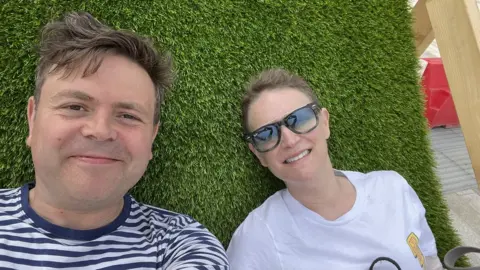 @geraintjohn_
@geraintjohn_Just four months ago, Geraint John lost his 43-year-old wife and the mother of his three children to pancreatic cancer.
The day Deb died, he became a solo parent to their three newly bereaved children while living with his own crushing grief.
He has chosen to tell his story to help others going through or preparing to go through the death of a partner.
He also has advice for anyone supporting someone who is bereaved.
Geraint, 41, said life changed overnight when Deb was diagnosed with stage two pancreatic cancer in March 2021.
"You've got this huge weight on your shoulders... you're grieving for the life you had before and you're in anticipatory grief, you know potentially what's coming and you're dreading it," he said.
"When it does happen you just get totally deflated and you just run out of steam, which is where I'm at now."
Geraint met Deb at a gig in 2005, three months later she quit her job in Nottingham to move to live with him in Cardiff and they married the following year.
They would go on to have three children - now aged 14, 12 and eight - and a move to London followed.
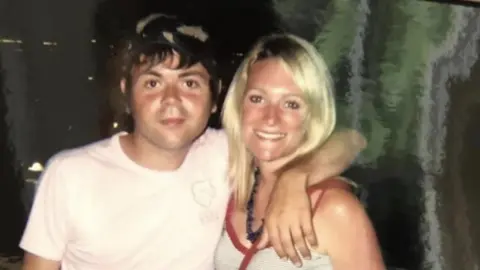 @geraintjohn_
@geraintjohn_"We were inseparable," said Geraint.
"A big part of our life was having fun and going out to restaurants and just enjoying ourselves.
"She was a really committed mum and an inspiration to the kids."
Geraint said when Deb, a civil servant, was first diagnosed they knew very little about pancreatic cancer so felt "massively optimistic".
Pancreatic cancer has the lowest survival of all common cancers, with five-year survival less than 7%, according to Pancreatic Cancer Action.
Breaking the news to the children
Deb faced a major operation to remove organs the cancer could spread to followed by months of chemotherapy but at the end of August was moved into a hospice where she died on 15 September.
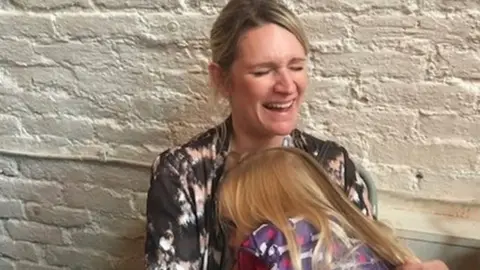 @geraintjohn_
@geraintjohn_"The really difficult part is obviously breaking the news to the children," said Geraint.
In preparation he had spoken to psychologists and made notes.
"You've got to be very clear," said Geraint.
"Essentially I had to just sit them down and tell them that Mum was going to die, she wasn't going to make it and that there was no uncertainty about that.
"And then you have to manage their expectations in terms of timescales as well."
He said it had been heart-breaking: "I've kind of blocked it out to be honest."
The day Deb died was completely surreal, said Geraint.
Allow X content?

"I had to explain to them that Mum was going to die within the next day and that we needed to say goodbye," he said.
"It's quite strange when you're in that situation, you have to be strong and you have to remember your role - essentially they're looking up to you and hanging on your every word and you go into overdrive...
"Then suddenly she's gone."
Returning home and seeing her belongings - coats, shoes, glasses - around the house was another surreal moment, said Geraint.
They escaped to a burger restaurant for dinner where they sat in silence.
How do you even begin to support three children who have just lost their mum while dealing with your own grief? All while suddenly being responsible for everything from the grocery shopping to the family calendar.
"My thing is that the house is just full of love, so not being strict, not putting any pressure on anyone, forgetting about all the routine... and talking about Deb constantly," he said.
He said before Deb died they had a conversation about her wishes for her funeral but did not talk a lot about how life might be after she was gone.
"We could have perhaps chatted a little bit more about the practicalities of me being here now on my own managing the household... but I wanted her to be positive and to feel like she's going to get through it," he said.
"I guess that is something that I regret perhaps a little bit."
Allow X content?

He and the children have been on a couple of holidays because that is where he gets to see them happy, he said.
This Christmas the family did not put up a tree, did not exchange presents and instead went on holiday to Antigua.
"Whilst it doesn't make it any better it just covers up the cracks for a bit," said Geraint.
In terms of taking care of himself he has found boxing to be cathartic and a good release of stress, he likes to go running and walking and found the recent World Cup in Qatar a "massive distraction".
Seeing a psychologist for a year before Deb died was also beneficial and helped manage his expectations of what was to come, he said.
"But I'm not going to dress it up - it's a very, very challenging period, and the reality is there's not much [that helps]," he said.
"You've got to go really easy on yourself - if you don't want to get up then don't get up, if the kids don't want to go to school then they don't have to go to school."
'People just can't cope'
Another difficulty can be other people's reactions.
"People just find it really, really tough to talk about - you bring it up and people just don't know how to react," he said.
"Some people just can't cope with it, they just turn their back to you."
Allow X content?

Sometimes people can say things that are "almost embarrassing", said Geraint.
"People always say 'at least she's not suffering', so that's a bit of a funny one.
"The other one is 'how are you doing?'
"I sometimes laugh out loud - 'is that a serious question? Really rubbish actually because Deb has died, I've got three kids, I'm on my own, it's fairly miserable. How are you doing?'."
He said in these moments he often finds himself speaking to Deb.
"I just go 'I cannot believe you've put me in this situation' and I can just feel her laughing at me," he laughed.
What should you say to someone who is bereaved?
Geraint said he appreciated it could be difficult to know the right thing to say.
"You've got to kind of say 'I'm really sorry for your loss' because you really appreciate that," he said.
"And you've got to give them the option - do you want to talk about it or do you not want to talk about it? And sometimes I say, 'I really don't want to talk about it' and sometimes I say, 'yeah' and you talk about it then."
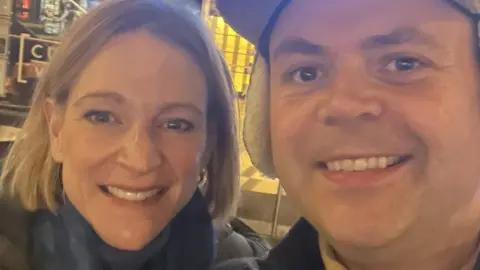 @geraintjohn_
@geraintjohn_He also advised people not to ask a bereaved person if they want help as they may be already inundated with questions.
"Just do it. If you're going to cook a lasagne or whatever, just bring one round. If you want to come over and take the kids, just come over and take the kids," he said.
"Don't be scared, don't feel like you can't do that. If you're mates with someone just be there for them."
He said suggesting going for a walk or a coffee may be better than going to the pub.
Immediately after Deb died many people rallied to help, he said.
"Everyone loves a lasagne so I think at one point we had eight or nine lasagnes...
"I think I had a lasagne for breakfast once actually," he joked.
While some have stayed close - one friend still visits weekly with a meal and "a bit of a laugh" with the family - others start to drop away at the three-month point, he said.
"People just assume that you are okay," he said.
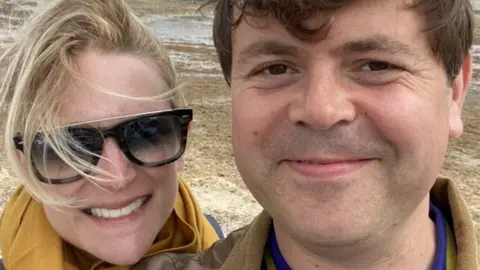 @geraintjohn_
@geraintjohn_Geraint has been sharing his journey on social media and said it is easy to interpret some of what he shares as him doing well.
"The reality is, we all know that social media sometimes just isn't a reflection of how you're truly feeling at times," he said.
His social media posts have prompted many other bereaved people to get in touch as well as others, including a footballer from the Wales team, who want to offer support or condolences.
The owner of one restaurant chain put on a free Sunday lunch for the family, another person gave them a private tour of a cat sanctuary, pizza delivery companies have sent pizzas, someone offered the use of their holiday cottage and others have offered to turn Deb's clothes into bears for the children.
"The world's a really nice place and people can be really, really kind and that's what I'm finding now," he said.
'Processing the trauma'
With Deb's death being so recent, Geraint said he and the children needed time to process the colossal events of the past two years.
The family are starting individual bereavement counselling and will also be taking up the offer of support from the hospice and the children's school.
Geraint is also in the process of returning to work - he owns and runs a digital agency that provides digital services and makes podcasts - but it is not easy.
Allow X content?

"Most of the day I'm just trying to make sense of what has happened over the last two years," he said
"How somebody so talented and beautiful and such an amazing mum, my wife, got taken away - it just seems unfair. It's going to take ages to be able to process that, I don't think I have processed it really."
Have the past two years changed his outlook on life?
"There's been a massive shift in mindset," he said.
"One thing I regret is perhaps not enjoying the moment a bit more when Deb was healthy."
He said he wished he hadn't got so "bogged down and stressed" with work.
"If I could go back now I'd say 'Geraint, just don't worry about that'."
He said since Deb's death he finds he does not generally get stressed about things in the way he used to.
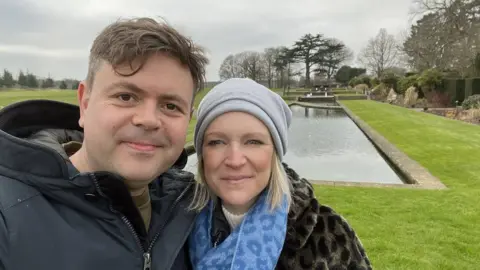 @geraintjohn_
@geraintjohn_'I'm grateful'
The experience has taught him to "enjoy every second, every moment like it's your last because today could be your last".
"People always say 'are you angry?'," he said.
"But I don't find that. I'm grateful for what we had, and I'm grateful for the experiences. I'm grateful for her."
If you have been affected by issues raised in this story you can find details of where you can get support at BBC Action Line.
